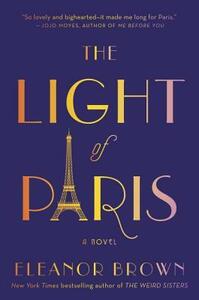Take a photo of a barcode or cover
A sweet story. Madeline's story is sad, hopeful, and realistic. Her grandmother's story fell a bit flat -- perhaps because the author didn't show Margie's actually journals, but rather Madeline's retelling of her grandmother's story.
Although the ending of this book didn't thrill me at first and it was a bit different than the summary promised, I really enjoyed this book! Worth it just for the descriptions of Paris.
The Light of Paris by Eleanor Brown goes back and forth between the stories of two women as they struggle to find their own identity. Decades apart, the two women face somewhat the same issue. What role do family expectations and obligations play in our choices? The book is a quick and entertaining read but with enough substance to leave me reflecting on choices made and the paths not taken.
Read my complete review at http://www.memoriesfrombooks.com/2016/07/the-light-of-paris.html.
Reviewed based on a publisher’s galley received through NetGalley.
Read my complete review at http://www.memoriesfrombooks.com/2016/07/the-light-of-paris.html.
Reviewed based on a publisher’s galley received through NetGalley.
Loved the portrayal of 1920's Paris. I loved how the city was almost a character in the novel. Didn't love how whiny and weak Madeleine and Margie came off, though. I don't mind reading about unlikable characters, but it was really hard to root for these two because they were so passive. Margie got a little bit better after she went to Paris, but I feel like Madeleine got worse as the story went on. I also thought Margie should have narrated her own chapters. I'm not really sure why the author chose to have Madeleine narrate them for her. I know she was reading Margie's journals, but it made me feel too removed from the action.
Overall, meh. The gender roles should make for an interesting book club discussion, though.
Overall, meh. The gender roles should make for an interesting book club discussion, though.
I liked Margie’s story, which was told through her journal that her granddaughter Madeleine found. However, it was hard for me to muster up much sympathy for a Madeleine, a woman who had grown up rich and married a rich husband and was living the life of a rich socialite. No one forced her to get married and stay in that lifestyle. Her parents wouldn’t have disowned her if she didn’t get married. It was 1999 – she could have done anything really. Her lack of backbone made me angry with her. The reader was supposed to empathize with her but I just couldn’t.
I could empathize with Margie because she was growing up in the early 1900s, a time when women really didn’t have any other choice but to get married in order to have a decent life. And yet Margie is able to rebel for a summer and have a romantic, adventurous summer in Paris. I enjoyed reading about her life and adventures there.
I may have had my expectations too high for this book and that’s why I was so disappointed with it. I loved Eleanor Brown’s first book, The Weird Sisters, and I was hoping to love The Light of Paris just as much. It seems that Brown has fallen victim to the curse of the sophomore slump.
I could empathize with Margie because she was growing up in the early 1900s, a time when women really didn’t have any other choice but to get married in order to have a decent life. And yet Margie is able to rebel for a summer and have a romantic, adventurous summer in Paris. I enjoyed reading about her life and adventures there.
I may have had my expectations too high for this book and that’s why I was so disappointed with it. I loved Eleanor Brown’s first book, The Weird Sisters, and I was hoping to love The Light of Paris just as much. It seems that Brown has fallen victim to the curse of the sophomore slump.
I really enjoyed the color of this book. It was a two-story book--one in the 90s with Madeleine, and then flashbacks to her grandmother's story in 1920s Paris. I loved the descriptions and the character and the flavour of the book. Delightful.
I finished it...but only because it was this month's book club pick.
This book took me a little while to get into. I was initially very turned off by the main character, who seemed to accept all sorts of emotional abuse from her lame duck of a husband with a meek smile and regrets of giving up anything that made her happy but with no inclination to get them back. That changed, of course, and by the end I even sort of respected her.
Madeleine and Margie are two women living similar lives seventy-five years apart. In 1924, five years after her debut, Margie finds herself still unmarried and increasingly without prospects. But when her selfish cousin needs a chaperon for a European tour Margie is enlisted for the job. In Paris she's finds a whole new way of life, one she doesn't ever want to give up. In 1999 Margie's granddaughter, Madeleine, is unhappy in her marriage to an austere businessman in Chicago. But when she goes home for a visit to the midsized city of Magnolia, where she grew up, she finds out there's much more to the town than she ever knew. Soon she finds her grandmother's journals and realizes there's far more to life than what she was conditioned to expect.
The theme of this novel was living the life that you want to live and not accepting the repressed expectations of those around you. Oh boy was that the theme. No theme has ever been more obvious. And for Margie's storyline it made a little sense. The twenties were an interesting time in history because Europe had just been through something that changed everything and the United States was riding high on the stock market, the end of the Gilded Age, and our first taste of global superiority (warranted or not). Things were changing and Margie was attempting to change with the times and meeting resistance from her traditionalist parents. Madeleine, on the other hand, didn't have much of an excuse. Sure, she was trying to please her family, but I just can't understand why anyone would live the way she lived and not rebel.
Another thing that bothered me was the characterization of Paris. It felt like the author had read books and watched movies that romanticized Paris and put all those tropes and cliches straight into the book. Now, don't get me wrong, all those cliches are true. In fact, I read this book because it had Paris in the title and when I went there for the first time I fell rapidly and consumingly in love with it. Everything is better in Paris. But, there's a lot more to Paris than cafes and baguettes and dashing men. Adding those details might have helped make this Paris real, instead of the Paris that exists in the minds of starry eyed American teenagers.
Madeleine and Margie are two women living similar lives seventy-five years apart. In 1924, five years after her debut, Margie finds herself still unmarried and increasingly without prospects. But when her selfish cousin needs a chaperon for a European tour Margie is enlisted for the job. In Paris she's finds a whole new way of life, one she doesn't ever want to give up. In 1999 Margie's granddaughter, Madeleine, is unhappy in her marriage to an austere businessman in Chicago. But when she goes home for a visit to the midsized city of Magnolia, where she grew up, she finds out there's much more to the town than she ever knew. Soon she finds her grandmother's journals and realizes there's far more to life than what she was conditioned to expect.
The theme of this novel was living the life that you want to live and not accepting the repressed expectations of those around you. Oh boy was that the theme. No theme has ever been more obvious. And for Margie's storyline it made a little sense. The twenties were an interesting time in history because Europe had just been through something that changed everything and the United States was riding high on the stock market, the end of the Gilded Age, and our first taste of global superiority (warranted or not). Things were changing and Margie was attempting to change with the times and meeting resistance from her traditionalist parents. Madeleine, on the other hand, didn't have much of an excuse. Sure, she was trying to please her family, but I just can't understand why anyone would live the way she lived and not rebel.
Another thing that bothered me was the characterization of Paris. It felt like the author had read books and watched movies that romanticized Paris and put all those tropes and cliches straight into the book. Now, don't get me wrong, all those cliches are true. In fact, I read this book because it had Paris in the title and when I went there for the first time I fell rapidly and consumingly in love with it. Everything is better in Paris. But, there's a lot more to Paris than cafes and baguettes and dashing men. Adding those details might have helped make this Paris real, instead of the Paris that exists in the minds of starry eyed American teenagers.
I liked Weird Sisters better. The Madelyn is a little too whiney, but I enjoyed the story and the way Eleanor Brown writes.






